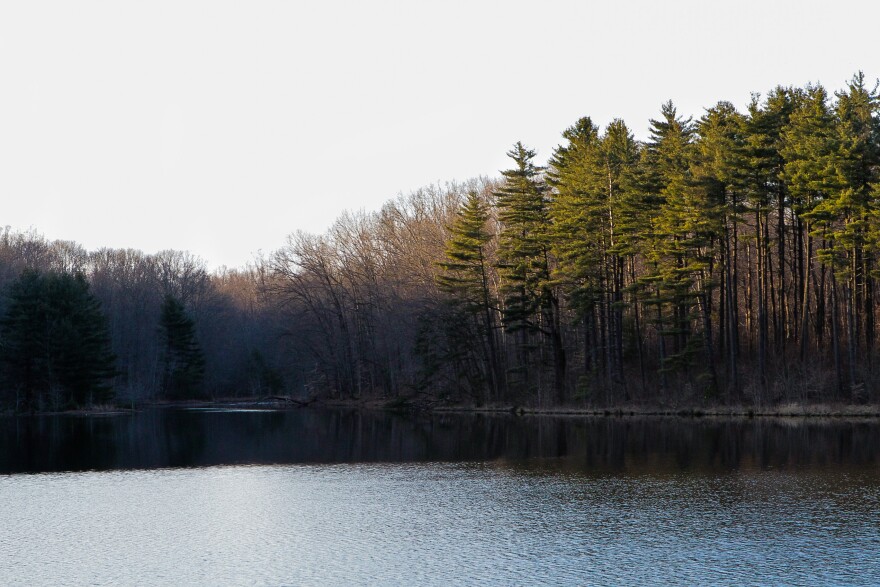“I water my horses out of this creek down here,” Jeff Ivers says, resting his hand on his horse’s nose.
He looks out over his land: 43 acres, surrounded on three sides by Perry State Forest, with a small creek running through it.
“It’s safe as far as human consumption, as long as you filter it," Ivers says. "But I have well water and if they mine, there’s a chance of ruining my well, definitely ruin the creeks. If they ruin all that, how am I going to live?”
Residents of rural Perry County, about an hour southeast of Columbus, say life there is peaceful in large part because of their neighbor: the 4,500-acre Perry State Forest. But they worry the forest and their livelihoods may soon be disturbed.
Ivers and many of his neighbors are concerned about a planned 545-acre strip mine that, if approved, would take 12 percent of the entire forest. Research shows that strip mining can pollute waterways, increase risk of contamination of ground water, and lead to air and noise pollution.
“We’ve got a 5-year-old daughter we’d like to raise and keep her in the country, keep her a nice clean free spirit,” Ivers says. “You can’t do that if they’re mining around you. It’ll be, ‘Daddy, what is that noise? What are they doing?’ You want to hear back up beepers while you sleep? I don’t.”
Perry State Forest is one of the most popular places in the state for ATV and horseback riding, thanks to a rugged and barren terrain left behind by a previous strip mine that was never restored to its natural state.

Surrounding Perry County has one of the highest unemployment rates in the state–6 percent–and Ivers fears the jobs a mine might bring to the area wouldn’t outweigh the damage done to the local economy.
“This area, this forest, creates a lot of revenue for this town,” Ivers says. “They just don’t see that. And they think mining is going to create more revenue? I don’t see how.”
Financial Woes And New Owners
Oxford Mining Company submitted the permit application to mine the Perry State Forest at the end of 2017.
Oxford was owned by Westmoreland, which is one of the largest coal companies in North America. But in October 2018, Westmoreland made national news by filing for Chapter 11 bankruptcy.
After Westmoreland declared bankruptcy, Oxford was purchased by its former owner, Charles Ungarean, who formed a new company called CCU Coal and Construction.
“The mining proposed by CCU is expected to improve the environmental health of the area by reclaiming the previously unreclaimed ground located in the Perry State Forest,” says Greg Honish, vice president of CCU. “All of this will be accomplished with no cost for the taxpayers of Ohio.”
By buying Oxford, CCU inherits more than a dozen environmental violations, as well as any liability for the thousands of acres of mine land Oxford owns in Ohio.

The company's track record and the declining market for coal leave many residents worried. And a depleted state fund for cleaning up abandoned mine land only worsens their fears.
At a recent public meeting at nearby New Lexington High School, Lanny Erdos of the Ohio Department of Natural Resources says Oxford’s recent bankruptcy proceedings are not factored into the approval of mining permits.
“We don’t go in and look at the financial status of the company," Erdos says.
Right now, the Ohio Department of Natural Resources is the only barrier between CCU and mining the state forest. The Ohio Environmental Protection Agency already issued a permit to Oxford, which is being appealed.
Erdos says ODNR is waiting for revisions to the application from the company, and that neighbors of the forest are doing the right thing by asking questions. His office already received nearly 1,000 emails, he says.
When asked how often a community is able to stop a mining project, he was unable to give an estimate. Erdos says community input is being brought to the company.
However, if CCU meets all the application requirements, ODNR is required to approve the permit.

"That's All We Can Do"
Yellow dots painted on the trees mark where Bonnie Garey’s property touches the southern end of the proposed mine.
“They can mine, I was told, up to 300 feet from your property line,” she says.
Her parents bought this land in 1962, and Bonnie spent her whole life and raised her kids here. She says she was devastated when the forest near her home was clear cut, presumably to make way for the mine.
“It’s upsetting because this is where my kids are,” Garey says, crying. “But, ya know, we have to get used to change and if that’s the way it is, that’s the way it is. And I’ve already said in my mind, that if it happens it happens and we gave it all we got. That’s all we can do.”
It’s still unclear how long Garey and her neighbors will have to wait. ODNR officials don’t know how long the permit process might take.
Still, Garey is not optimistic about their chances stopping the mine, or about what will happen if it arrives.
"We won’t know how bad it’s gonna be until it actually happens, and then you know, who has to deal with it?" Garey says. "It’s going to be us."







